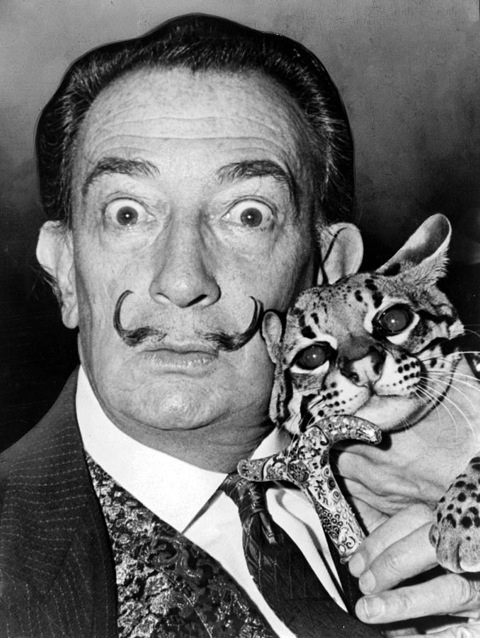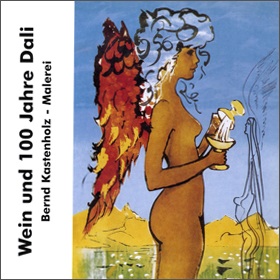Home
|
Prometheus
Nr. 197
|
Alexander
Order
Salvador
Dalí died 25 years ago
Memories of
the surrealist and his „Divina Comedia" by
Dante
By B. John Zavrel

Salvador
Dali with
a tame ocelot in the year 1965 in New York. The acquisition of
several of these fascinating animals was arranged by Dalí's
manager and friend, Captain
Peter Moore.
He kept the animals in his garden park with a swimming-pool (also for
the animals) in Cadaques. Dalí
took out the unusual animals to his great public appearances. They
were also admired, when Dalí had receptions for the media in
his house at the sea, or in Paris.
Foto: wikipedia
Figueres/New York
(mea)
Salvador Dali died 25 years ago.
It was on January 23, 1989, when Dalí closed his eyes in his
native town Figueres (Girona, Catalonia).
In order
to honor this art genius, today in the month of January 2014, we
remember his massive illustration of a text of world literature: "The
Divine Comedy" by Dante Alighieri. These
illustrations by Dalí contain 100 color pictures. They
fascinate us by their depiction and also by the joyful colors in the
quality of the watercolors.
Dante Alighieri (1265 in Florenz till
September 14, 1321 in Ravenna) was a poet and a philosopher who wrote
in the Italian language. He passed over as the author of the Divine
Comedy" the Latin, which had dominated until that time, and set up
the Italian language as a language of great literature. Today, Dante
is the most known poet of the Italian language and is esteemed as one
of the most significant poets of the European Middle Ages.
The great journey
to the other side
The story of the Divine Comedia is
"the great journey" to the afterlife. Dante transports himself into
this imaginary wanderings in the search of his platonic love, the
beautiful, young Bearice. During this adventurous and dangerous
undertaking he must first pass through the depths of Hell, then
through Purgatorio, until he finally reaches the heavenly Paradise.
It is there, where he sees Beatrice in divine light in her full
beauty.
These visionary images of the poet
interested Dalí, who liked to hear to be referred to as "the
divine". In addition, he made a connection between himself and his
wife Gala with the relationship between Dante and
Beatrice.

"LA DIVINA
COMEDIA"--Dieser
einzigartige Farbkatalog von Salvador
Dalí
zeigt alle 100 aquarellartigen Illustrationen zur
"Göttlichen
Komödie"
von Dante. Die repräsentativen, auch ganzseitigen Abbildungen
aus dem Zyklus Hölle-Fegefeuer-Paradies werden mit
erklärenden Texten zu den 100 Gesängen (Cantos)
beschrieben. Der Katalog kostet 18 Euro plus Porto.
Bitte
richten Sie Bestellungen aus Europa
an
Marco-vg@t-online.de
Bestellungen
aus USA und Kanada an
zavrel@meaus.com
Foto: Art-Press
Dante researchers
collect quotes
How much was Dalí involved in
the themes of the Divine Comedy, can be seen in quotes, which
Dalí researchers and lovers collected over the
years.
Thus, in the year 1950 during an
interview, Dalí answered the question what got him interested
to illustrate "The Divine Comedy". In reply he gave insights into the
situation of the project: "I was given a commission to create a
monumental task, and I plan to complete it this summer in
Cadaqués. It is a work which both attracts and possesses me,
since I see both its aspects also in my own life. The book has
enchanted me, and in my mind I see by work already
completed."
As eventually things did not go as
well with the project as was promised to him originally, Dalí
reported two years later how he was able to turn a threatening
disaster into a lucrative advantage: "Finally I was able to triple
(my commission) under the circumstances, which were even more
remarkable to do the fact that I dealt with the Italian government.
The minister of culture at the time gave me the commission to
illustrate Dante's Divine Comedy. I had sent out the watercolor
paintings for the illustrations, the state printer Instituto
Poligrafico dello Stato prepared the plates for at least seven of the
pictures in the original size, I received my money and was happy
about it. Then suddenly there erupted a scandal in Rome. A member of
the opposition found out that the commission was awarded to a foreign
artist, a Spaniard (namely, Dalí) to illustrate the work of
the greatest poet in Italian history. With an incomparable
chauvinism, Italy's members of the parliament closed the ranks behind
him against this treason against the soul of Italy."
A Frenchman saves
the project
That the illustrated Dante poem
became a reality in spite of these setbacks, happened thanks to a
French publisher. The continuation of this "drama' was outlined by
Dalí in his flowery speaking manner" "The government (in Rome)
was shaken in its foundations. I found myself to be offended and
determined to amuse myself. But the minister, who did not know how to
dodge his head from the flying tomatoes, did not know what to do, and
he begged me not to take legal actions. He offered me to keep the
money and the finished plates under the condition that one will not
talk any more in Italy about an edition by Dalí. I kept my
work and turned over the rights for the double price to a French
publisher (in 1960 to Joseph Fôret)."
Dalí also gave reasons, why
the illustrations were in color and with an air of mysticism and not
at all like other illustrations by him in black. "The Romanticism has
caused us to think that Hell is black, just like the charcoal mines
by Gustave Dorés, in which one does not see anything. No, the
Inferno by Dalí is lit by the sun and the honey of the
Mediterranean."
Dalí-Dante:
Exhibition for the 110th birthday anniversary
Exhibition „La Divina Comedia"
by Salvador Dalí will take place in Germany in 2014, on the
occasion of the 110th birthday anniversary at the Museum of European
Art at the Noervenich Castle near Cologne) www.schloss-nörvenich.de
and schloss-Noervenich@gmx.de
In USA: "La Divina Comedia" by
Salvador Dalí, Museum of European Art in Clarence, New
York.
Disclaimer: The
contents of this article are of sole responsibility of the author(s).
The journal PROMETHEUS will not be responsible for any inaccurate or
incorrect statement in this article.
www.meaus.com
contains copyrighted material the use of which has not always been
specifically authorized by the copyright owner. We are making such
material available to our readers under the provisions of "fair use"
in an effort to advance a better understanding of political, economic
and social issues. The material on this site is distributed without
profit to those who have expressed a prior interest in receiving it
for research and educational purposes. If you wish to use copyrighted
material for purposes other than "fair use" you must request
permission from the copyright owner.
For media
enquiries:
info@meaus.com
Copyright 2014
Prometheus
PROMETHEUS,
Internet Bulletin for Art, News, Politics and Science, Nr. 197,
January 2014